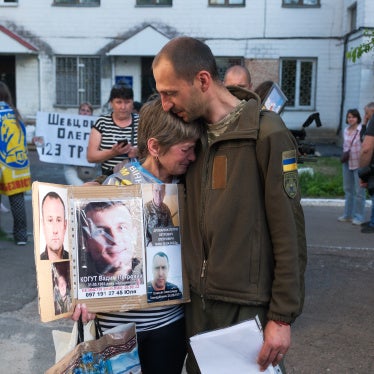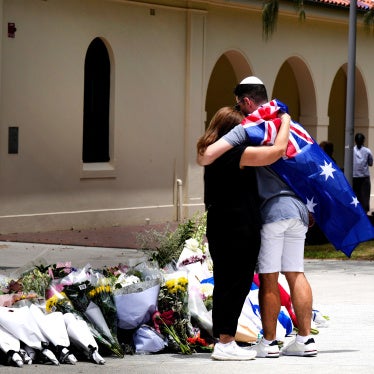(Beirut) – Iraqi authorities should conduct an immediate, full, and transparent investigation into the September 8, 2011 killing of Hadi al-Mahdi, a popular radio journalist often critical of the government, at his home in Baghdad, and prosecute those responsible, Human Rights Watch said today.
“The killing of Hadi al-Mahdi sadly highlights that journalism in Iraq remains a deadly profession,” said Joe Stork, deputy Middle East director at Human Rights Watch. “After more than six years of democratic rule, Iraqis who publicly express their views still do so at great peril.”
Witnesses at the crime scene told Human Rights Watch that they saw no evidence of a struggle or theft, suggesting that the killing was deliberate. Al-Mahdi’s cell phone, laptop, and other valuables were left in the house untouched.
Al-Mahdi, a freelance journalist and theater director, had been openly critical of government corruption and social inequality in Iraq. His popular talk radio program, “To Whoever Listens,” ran three times a week in Baghdad before he left the show two months ago. The program’s appeal was al-Mahdi’s fearless and scathing voice, laced with a sense of humor, Human Rights Watch said. Leading up to the country’s “Day of Anger” mass pro-democracy and anti-corruption demonstrations on February 25, he became increasingly involved as a vocal organizer of Iraq’s new protest movement in Baghdad.
Human Rights Watch spoke with al-Mahdi during the demonstration on February 25, and he stressed the importance of peaceful protest. As riot police began acting aggressively and groups of protesters started to throw hundreds of rocks, Human Rights Watch saw al-Mahdi take a leadership role with those who locked arms and made a human chain between angry crowds and riot police in an attempt to keep the peace. Many who did so were injured by rocks or by the riot police’s use of force.
After the protests, security forces arrested him and three other journalists at a Baghdad restaurant. They beat and blindfolded them, and threatened them with torture during their subsequent interrogation. Al-Mahdi told Human Rights Watch after they were released the next day that interrogators had forced him, while blindfolded, to sign what he was told was a criminal confession and also a pledge to refrain from participating in future demonstrations. He showed Human Rights Watch bruises and red marks on his face, neck, and shoulders, as well as on his legs and abdomen.
Al-Mahdi continued to attend and organize many of the weekly Friday demonstrations that followed in Baghdad’s Tahrir Square. He told Human Rights Watch that on March 4, an unknown man in the crowd approached him in an intimidating fashion and said that security forces were watching him, and then listed all of the people al-Mahdi had called on his phone that day. Al-Mahdi said on March 11 that in the previous week he had been threatened several times by phone or text message not to return to Tahrir Square.
Al-Mahdi was also one of the prominent organizers of a big demonstration planned for the first Friday after the end of the month-long Muslim holiday of Ramadan, on September 9. His Facebook profile picture was an announcement for the demonstration, and he posted the following message describing threats against him in the hours before his death:
Enough ... I have lived the last three days in a state of terror. There are some who call me and warn me of raids and arrests of protesters. There is someone saying that the government will do this and that. There is someone with a fake name coming on to Facebook to threaten me. I will take part in the demonstrations, for I am one of its supporters. I firmly believe that the political process embodies a national, economic, and political failure. It deserves to change, and we deserve a better government. In short, I do not represent any political party or any other side, but rather the miserable reality in which we live. ... I am sick of seeing our mothers beg in the streets and I am sick of news of politicians’ gluttony and of their looting of Iraq's riches.
The killing of al-Mahdi follows years of targeted violence against journalists in Iraq. Most recently, on August 29, an assailant beat a prominent journalist, Asos Hardi, in Sulaimaniya with a pistol, requiring Hardi’s hospitalization and 32 stitches.
Since the start of protests in Iraq in February over widespread corruption and lack of services, journalists have faced escalating attacks and threats, including from members of the government’s security forces.
“In Iraq, we’re used to journalists being attacked, but this one was close to the bone,” Ammaral-Shahbander, head of the Institute for War and Peace Reporting in Iraq and a friend of al-Mahdi’s, told Human Rights Watch after seeing al-Mahdi’s body lying in the kitchen at his home. “This attack was different because usually journalists here have been killed in the line of duty, and you expect fatalities in war zones. But sitting in your own home and getting shot like this is too much to bear.”
Emad al-Ebadi, another friend of al-Mahdi’s, told Human Rights Watch that al-Mahdi confided that he was receiving daily death threats via social media and cell phones with blocked numbers: “He would come to me very upset and angry and shows me the incoming calls to support his allegations. I used to try always to calm him down and tell him to not care that much about these phone calls and advise him to be careful at the same time and stay alert.”
Al-Ebadi, a television journalist who has frequently criticized parliamentary and government figures, survived an attempt on his life on November 23, 2009, when unknown assailants shot him in the neck and head.
Al-Shahbander expressed hope that al-Mahdi’s killing would not deter Iraq’s journalists from reporting on events in the country.
“So many journalists have been kidnapped and killed in Iraq but it doesn’t matter how many are tortured, intimidated, or killed – journalists will continue doing their jobs,” he said. “This attack just shows how desperate the enemies of democracy have become.”





